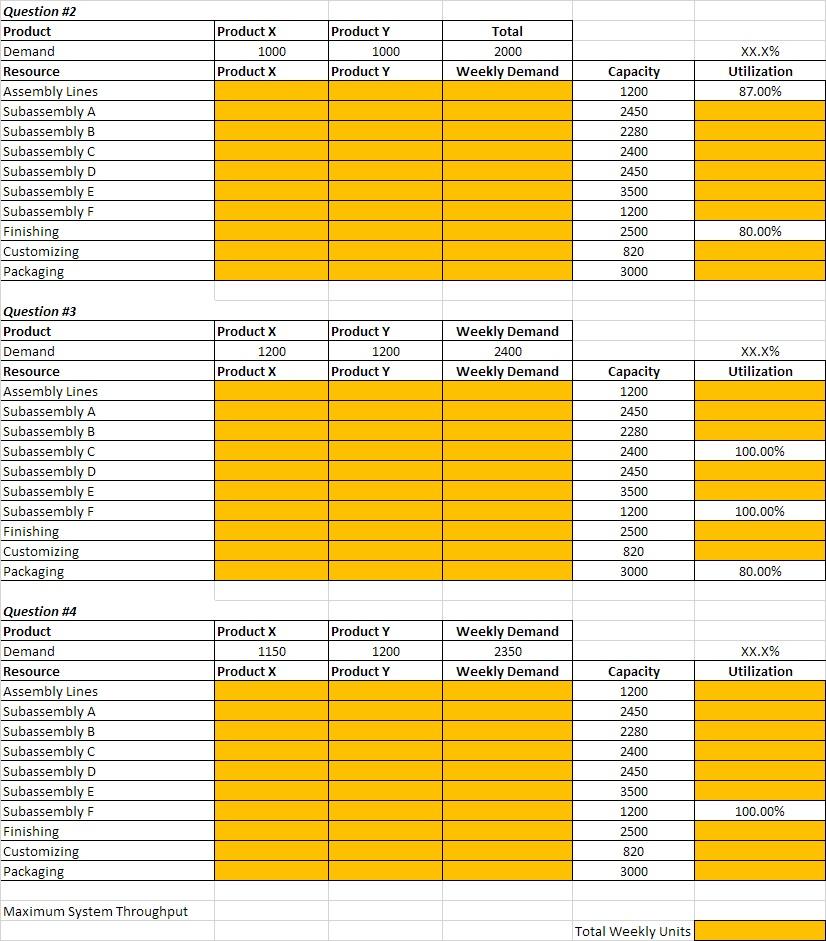Question
I need help putting numbers in the yellow areas, I don't need written answers to the questions. Just the Product X, Y, Weekly Demand and

I need help putting numbers in the yellow areas, I don't need written answers to the questions. Just the Product X, Y, Weekly Demand and especially the % in the Utilization.
You manage the production process in the high-tech facility of Dale Computers Inc. The facility produces two products (X&Y) - see Product Make Up & Annual Demand table for details. The facility consists of three different assembly lines - see Assembly Capability & Capacity Table below.
The production process begins with the procurement of raw materials from suppliers. Next, the raw materials are processed into six independent subassemblies, A-F, in separate work areas within the facility. Each product is then assembled on one of the assembly lines (see Subassembly & Post Assembly Capacity Table for sub assembly details). Following assembly, each product is finished, customized (painted and other options added), packaged and shipped. Current trends indicate that 20% of product X and 50% of product Y are customized.
Product Makeup & Annual Demand:
Product Sub-assemblies required for one unit of product Annual Unit Sales
X A= 2, B=1, C=1, E=1 52,000
Y B=1, C=1, D=2, E=2, F=1 52,000
Notes:
(1) Assume 52 operating weeks/year.
(2) Plan production to meet annual demand (do not overproduce).
Assembly Capability Table:
Assembly Line Capability (Units/Week) Capacity (Units / Week)
1 Either Product 1200
2 Product X 500
3 Product Y 600
Subassembly & Post Assembly Capacity Table:
Subassembly Capacity (Units/Week)
Subassembly A: 2450
Subassembly B: 2280
Subassembly C: 2400
Subassembly D: 2450
Subassembly E: 3500
Subassembly F: 1200
Finishing: 2500
Customizing: 820
Packaging: 3000
2) With the current weekly demands of 1000 for each product X and Y, what is the current bottleneck resource? Answer: Finishing
3) Management must deal with changing demand and resource constraints, by analyzing alternative business scenarios. If the weekly demand for X and Y both increased by 20%, identify the top three bottleneck resources.
4) Now, if demands for X and Y change disproportionately (X by 15%, Y by 20%), what are the top three bottleneck resources? What is the maximum weekly throughput of the system for product X & product Y? If you could increase capacity in only one resource in this scenario, which one would it be and why?
Question \#2 Question \#3 Question \#4 Maximum System Throughput Total Weekly Units Question \#2 Question \#3 Question \#4 Maximum System Throughput Total Weekly UnitsStep by Step Solution
There are 3 Steps involved in it
Step: 1

Get Instant Access to Expert-Tailored Solutions
See step-by-step solutions with expert insights and AI powered tools for academic success
Step: 2

Step: 3

Ace Your Homework with AI
Get the answers you need in no time with our AI-driven, step-by-step assistance
Get Started


